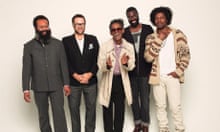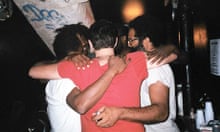In Brooklyn the skies are a thick slate grey. The temperature hasn't moved up the scale much in a while. "I think it's really time we learned that there's no such thing as seasons any more," says Tunde Adebimpe. "New York appears to be entering its sixth month of winter."
It's not just the weather that's in a strange place right now. Adebimpe's band, TV On The Radio have just completed their new album, Nine Types Of Light. It's the follow-up to 2008's Guardian album of the year Dear Science, the album widely hailed as their breakthrough. But far from bringing the band together, Dear Science nearly broke them apart. Dave Sitek, the band's producer and guitarist, upped sticks from TVOTR's historical Williamsburg base to Los Angeles where he recorded a guest-heavy solo album as Maximum Balloon. (He won't do interviews any more, either.)
Frontman Adebimpe and Kyp Malone, TVOTR's guitarist and lyricist, also began to pursue their own projects, while contractual obligations meant that the band's arrangement with British indie label 4AD was forced to come to an end. Then, just a couple of weeks ago, the announcement came that bassist Gerard Smith is battling lung cancer. It's safe to say this period has been the most troubled in the band's decade-long existence.
In truth, TV On The Radio have always felt like they're on the brink of something, be it the most amazing breakthrough or the most spectacular flame-out. ("We always have expectations for our themes and sounds and concepts," is how Adebimpe sees this, "but they jack-knife along the way.") The last time the Guardian met the band was back at the end of 2008 and they were feeling pretty good about things. Dear Science had been praised to the skies and tracks from it began popping up on the soundtracks to Skins, Damages and Breaking Bad. Their live show – once a rough and ready testament to fractured free expression – had become smart, tight and fantastically powerful. America had a new president and the global banking system had yet to fall in a ditch, dragging much of the rest of the planet with it. All in all, things were fairly peachy. And then the band went on the road …
'I knew I was in trouble when I began to realise exactly why Ozzy Osbourne became Ozzy Osbourne. As the tour went on I began to accept people's insanity as normal' - Tunde Adebimpe

Ask Adebimpe if anything's ever come close to really destroying TV On The Radio and he'll yell, "Oh many, many, many things!" But what really did nearly finish them off was the relentless, merciless grind of the global tour. "I'll tell you this, if we had toured Dear Science for one single more day it would have destroyed us," he says. "I knew I was in trouble when I began to realise exactly why Ozzy Osbourne became Ozzy Osbourne. As the tour went on I began to accept people's insanity as normal, and I'm not sure that's entirely healthy."
Done in a series of six-week bursts, the tour ended up lasting for 18 months. Malone likens it to "going to war. Or being in prison".
"It's like being stuck in a boat with a load of crazy people and you can't get out," says Adebimpe. In an effort to retain the balance of his mind the singer developed a strategy where he would play a gig then retreat straight to the tour bus where he'd climb into his bunk and simply read or draw. "I tried to be as absent as possible," he says. "I didn't see any other way to survive. Obviously, when I think about it now it all seems a bit weird to try to be that absent when you're travelling with the only four people you really want to speak to."
With Adebimpe holed up, the rest of the touring party would go out in search of the elusive good times. "I knew that would always end in disappointment," he says. Finally, then, the band ran out of road. TV On The Radio headed home and went in separate directions: Sitek to LA, Adebimpe and Malone to various destinations around the globe. The idea was to take a year off. Do other things. See other people. For six months that idea worked. Adebimpe even learned to stop worrying about everything quite so much: "Panic can become a very fruitless security blanket and it makes it easy to default to the negative. The truth is you're lucky to feel anything. I got sick of the cycles. I wanted to explore new things and new feelings."
Adebimpe felt a new urgency to document the way he was feeling. A book he was reading, Robert Brockway's Everything Is Going To Kill Everybody (subtitle: "The terrifyingly real ways the world wants you dead") also affected him. "You must appreciate the people you love and the life you live as anything can happen to it at any time," he says. As he began to change his mindset, all of a sudden new songs started to appear.
Nine Types Of Light was recorded at Sitek's new studio in LA but this was not an entirely peaceful experience, either. Adebimpe mutters about the location (in Beverly Hills) being "slap-bang in the middle of a four-block radius that encapsulates everything I hate about the place", before adding, "It was like some corporate suicide mission." That chimes with Malone's view on the music industry in general. "Totally shredded," he says, "it's just a mist now."
If the record hadn't leaked online, I would have taken it as a sign of indifference towards us' - Kyp Malone

Despite all the tensions, the new record vibrates with positivity, longing and, well, love. The beautiful Keep Your Heart spills over with bright enthusiasm ("Ill-advised enthusiasm," laughs Adebimpe), and features the most ridiculously wonderful falsetto chorus, while You is dramatically melodic synth-pop. Repetition ("What's the matter with your next door neighbour?/ I heard he had sex, drugs and danger") has a prog-punk howl and nabs a stylistic tic from Dream Warriors' 1990 mega hit My Definition Of A Boombastic Jazz Style, and Killer Crane seems to feature the soft twang of a banjo. It would seem anything is possible with this band. One pleased-with-themselves reviewer has already described the album as "important music for important times" but, with grim inevitability, just as the band were preparing to face back outwards into the world again, the record has leaked online. "If it hadn't happened", says Malone, "I would have taken it as a sign of indifference towards us."
"Oh, it's always someone at the record label," Adebimpe nods. "They see it as some new marketing technique. It does sort of spoil the moment. It's like a gift without the wrapping, just chucked at you, still in the plastic bag. But these things don't really matter; it's the music that brings clarity. Music can seep into you and recalibrate how you feel. That's the most important thing of all. Especially when life's been getting a little choppy."
For all their troubles, this remains a band that can rub up against floor-tickling disco and oddly sonorous country-soul as enthusiastically as it can pitch itself headlong into the wide-open dream-pop ether. There aren't many bands that can talk about Rebecca Black as poignantly as the unique appeal of John Coltrane ("I remember hearing him as a child and being a little repulsed"). The fact that TV On The Radio are not only still here, but actually stronger is a cause for serious celebration.
"I have learned a great deal about myself and the world being in this band," says Malone, on his way out to rehearsals. "The truth is that it nurtures me in ways that I'm only just beginning to understand."





Comments (…)
Sign in or create your Guardian account to join the discussion